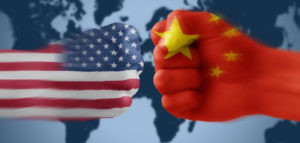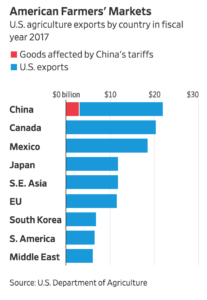
(Editor Note: this is the fourth post in a series examining the policies of the new GOP administration)
The View:
The unconstitutional Muslim and refugee ban institutionalizes fear as a policy. The use of fear as a governing instrument is evident in other ways as well. POTUS 45 is managing government staffs, tariffs, Mexican trade, picking favorites, and the repeal of Obamacare by manipulating people’s fears. The solution is to end the Muslim ban, and fight back on all these offensives being launched by the White House with initiatives based on building bridges, enabling job development and implementing smart win-win trade programs.
The Story:
On the evening of January 27, 2017 the wife of a Muslim ban detainee shared with an interviewer why she and her husband wanted to come to America:
“We wanted to come to America because we would be welcome, its big, and safe country…now I don’t know anymore.”
We are a country of trust, honesty, respect and equal opportunities for all, regardless of religion, sex, race or national origin.
The unconstitutional Muslim and refugee ban institutionalizes fear as a policy. Making the country safe is the reason offered for the ban. Yet, no terrorist acts on US soil since 9/11 have been caused by terrorists who immigrated into the country. The Cato Institute estimates there is a 1 in 3.6 billion chance that a refugee turned terrorist will cause a loss of life. The ban has a huge impact on the lives of immigrant families, friends and business colleagues in the US as well. The Washington Post analyzed State Department immigration data from 2015, and identified 90,000 people with immigrant or non-immigrant visas from the seven countries the ban covers. If the impact on immigrant relationships in the US are considered, hundreds of thousands are affected.
Already the ban has caused widespread anger, broken families and damage to economic links. There are 15,000 students, mostly Iranian that are affected by the ban. Many are graduate students and professors, some working on disease research helping Americans at labs like the Harvard Medical Center diabetes research center where Iranian Prof. Thomas Michel lost his visa last weekend. Scholars say that overseas colleagues are outraged by the ban, and have concerns about attending a conference in the US. As a result conferences are being scheduled outside the US.
Responses of some countries around the world are to ban or severely limit the visits of US citizens to their countries while others are threatening boycotts of American goods. Iran has announced that it was taking ‘reciprocal actions’ to ban US citizens from entering its country. Silicon Valley companies like Google and Facebook are trying to bring back employees stranded around the world. Businessmen working on deals in the US are cancelling trips for fear of not being able to return to their native country. Immigrants are the foundation of our growth economy, where 25 % of new firms are started by immigrants yet are only 15 % of the labor force. Most new jobs in our economy are generated by small firms, and foreign born workers are found in 25 % of new companies. Foreign born workers boost our labor participation rate by 2 times lifting our production of goods and services. Cities like Troy, Michigan and Columbus, Ohio have welcomed Syrian refugees boosting their economies where 11 % of Syrians own their own businesses versus 3 % native born. In Silicon Valley, the CEOs of Apple, Microsoft, Google, Airbnb, Netflix and Tesla have denounced the Muslim ban saying it would ‘wreak havoc’ on their businesses. Yesterday, 2000 Google employees staged a walkout to protest the ban, adding to the protests at airports nationwide. Venture capital firms are making more investments in places like Canada that have more accommodating visa policies for workers. Apple, Facebook, Google and Cisco all have offices in Canada. Several firms plan to increases hiring offshore because of the ban. To learn more please read our blog Immigrants Live in Fear of Mass Deportations, that provides examples of key immigrant contributions to the US economy.
The ban is rooted in nationalism and its corollary – protectionism. Protectionists say, ‘keep out foreigners who may do us harm or hurt our economy’. The ban combined with the administration’s proposed trade tariff fit this protectionist position. Protectionism has been tried in the past and led to severe economic isolation and depression in the 1930s, and eventually to World World II. From history we know that fear take over in 1930, when protectionism was widespread and other countries were seen as the villain. The Smoot-Hawley Act was passed in 1930 leveling tariffs on over 20,000 imported goods. Other countries retaliated including Canada who imposed tariffs on 30 % of the goods imported from the United States. Exports by US companies dropped 61 % by 1933 at the height of the Great Depression. Implementing protectionist policies will lead to severe world-wide economic loses and setup a volatile international environment possibly leading to new wars. Fifty years of alliances, trade pacts and integration of economies has led to relative peace and prosperity for most countries. Let’s learn from the bold post-WWII global economic work of world leaders.
The present administration has launched a protectionist offensive targeting Mexico. In our January 27th blog, Threatening Mexico Will Lead to Loss of American Jobs describes what happened with the recent 13 % drop in the Mexican Peso and 20 % drop in their stock market. The drop in the peso will make American products will more expensive for Mexicans – a major issue when Mexico receives 50 % of it gasoline from the US. The use of cyber bombs in the form of tweets by POTUS45 has resulted in economic damage already. Workers expecting new jobs at car plants that were cancelled see those jobs evaporating, and the price of gasoline has soared by 20 %. A planned meeting of the two countries has been cancelled and extreme uncertainty exists about the trade relationship worth $500 billion a year.
Picking favorites that serve the administration is another fear and control tactic. When Carrier Industries announced keeping jobs in Indiana, they received state subsidies and federal tax breaks – what about Carrier’s competitors did they receive the same breaks? No. This is not an even playing field to build a fair innovative economy. Sending cyber bombs to other industries is distorting careful management decision making designed to optimize the cash flow and profits of the company. We are all for keeping jobs in the US, through incentives and taxes but in an equitable way for all companies in a particular industry sector. This approach has another damaging element: playing favorites centralizes control of the economy in the White House, where they cannot possibly know the optimal approach to run a company or sector. Modern management approaches that have proven effective are to give as much authority as possible to the lower ranks of the corporation closest to the customer with autonomy to respond to local needs.
The administration’s centralized authority management style is being used with government agencies as well. NASA has received an edict from the administration last week that from now on ‘the agency will be run like a business from the White House’. Really, does the White House know how to run a sophisticated, complex, science based agency? We don’t think so. Plus, this dictatorial style of management has proven to be ineffective, resulting in poor quality of products and services. Many employees are leaving the agency causing a great loss of innovative ideas for the country and US businesses. This past weekend, fear has been used by the White House at the State department where over 1000 department employees used a Dissent Channel to protest the Muslim ban. The administration response was ‘if you don’t like the policy then leave’. Or the implication otherwise is we will fire you (where the Holman law was recently passed by the House to fire any federal employee at will). The Dissent Channel was setup as an anonymous way for employees to express their concern to State Department leaders on policies they disagree with. This communication offered a good way for differing ideas to be offered without fear of retribution. This intimidation based environment on the international front will mean that companies dealing with US partners will not be sure what to expect from a diplomatic department run by autocrats ensuring their favorites win in business deals.
Denying climate change is founded in fear of job losses. If climate change is true, and carbon emissions are contributing in a significant way then coal burning and fossil fuel use must be reduced – therefore causing job losses. Job losses are a legitimate concern. However, the administration using this fear to deny the evidence supported by 97 % of the scientific community is not helpful in formulating a solution. All people will be severely impacted by a warmer climate that causes significant environment and health problems. We need to recognize the truth in climate change and work together to ensure that there are jobs for those impacted the most by shifts in carbon based industries.
Fear is evident in the non-disclosure of his businesses by POTUS 45. All modern day presidents have disclosed their tax returns. Through disclosure the people will know where there are conflicts of interest that maybe damaging to our interests or put government staff in jeopardy. Our blog Investigate Possible POTUS Violation of the Emolument Clause offers more insights on this issue. The core feeling is fear of the people finding out how he is running and operating his businesses. Yet, transparency leads to honesty and trust. Trust is a better way to govern than creating distrust and uncertainty. The president has wide ranging world-wide business interests so we need to know when his government dealings could have a negative impact on competitors. He has already played favorites, so we need to watch for conflicts of interest or possible economic extortion by governments favoring their businesses.
When POTUS 45 fired the Acting Attorney General, Sally Yates yesterday, the clear message was that fear, policy and loyalty are above constitutional law. When Yates was confirmed in 2015, Sen Jeff Sessions asked her if she should say no to a presidential order if it were unconstitutional. She replied that yes she would say no as an advisor to the president. Using the word ‘betrayal’ in her firing letter showed a loyalty edge and lack of respect for her expertise and service to the country. The AG firing sends a message that the law is what he says it is for his own purposes. To those that don’t do what he wants they should fear reprisals. He does not seem to respect the constitution as a compact between the people and their leaders. The compact basically says that if the president acts within its provisions the people will support him and vice versa. When random interpretations are promoted, the people have no yardstick to evaluate the actions of their leader. Arbitrary interpretation of the law has economic consequences; if the US government can disobey its own laws at anytime, how can a business feel comfortable making agreements with the US government or companies supported by US law?
The GOP administration proposal to repeal Obamacare is rooted in fears of the Elite of losing health care or degraded quality in services. The thinking goes ‘If we have to share healthcare resources, doctors, hospitals, medicines and expertise with all people, we will have less’. They view healthcare resource distribution as a zero sum game. That’s why proposals from the GOP are for ‘access to health care’ not ‘providing healthcare’. In all modern countries except the US, quality healthcare is a right. For developed countries this policy makes sense. Healthier people will be happier, more productive, live longer and will enjoy a better economy.
The use of institutionalized fear via policies must end, now!
Turning now to solutions, from a tweet in response to the Muslim Ban:
“What’s wrong with America, can be fixed by what’s right with America.”
The ‘light on the hill’ that this country represents to the world got a lot dimmer last Friday night, but it is still flickering. The spontaneous airport protests and volunteer lawyers swooping in to help victimized detainees is a testament to the people’s power. Let’s commit to making the light on the hill burn brighter than ever for all.
The Solution:
- End the Muslim Ban immediately, focus on welcoming immigrants, support their contributions to our economy to boost our labor participation rate and GDP
- Use modern management-by-objectives techniques to manage the federal government and push authority to the lowest levels in agencies to maximize efficiency and results.
- Use scientific evidence to make fact based decisions and solutions
- Use win-win smart partnership agreements with our planet neighbors
- Ensure that all Americans have good health care
- Free public college level education
- Fund public infrastructure investments paid by corporation taxes paying their fair share
- Deploy national innovative job development zones based on the Silicon Valley model
- Develop a jobs policy acknowledging automation and creating complementary jobs in those heavily automated industries
(Editor Note: references for this post are in the Research tab – under Fear Policies)



